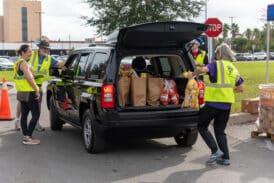News Release: Kroger Racing Gives Back to Orlando-area Veteran and Military Families Ahead of Coke Zero Sugar 400
August 21, 2024
Kroger Racing Gives Back to Orlando-area Veteran and Military Families Ahead of Coke Zero Sugar 400
Kroger, Bimbo Bakeries USA, and Kraft Heinz Company come together for Soldiers’ Angels August 23 event providing 250 low-income families with food
The national nonprofit Soldiers’ Angels will be supported by Kroger, Bimbo Bakeries USA, and the Kraft Heinz Company for a special Military and Veteran Food Distribution prior to the Coke Zero Sugar 400 NASCAR Cup Series race at DAYTONA International Speedway. The event will support 250 pre-registered low-income and at-risk Veterans and active-duty military families from the Orlando area with groceries.
Kroger Racing NASCAR Cup Series driver Ricky Stenhouse Jr. will be in attendance to help deliver food to the recipients as a representative of his partners at Kroger, Bimbo Bakeries USA, and Kraft. On Saturday, Stenhouse Jr. will compete at DAYTONA driving the No. 47 Kroger/Biggie Muffins/Capri Sun Chevrolet Camaro.
Soldiers’ Angels, the national nonprofit that provides more food exclusively to Veterans than any other organization in America, hosts a monthly food distribution for Orlando-area Veterans, active duty Service Members, Guardsmen, and Reservists in need of food assistance. Participants must pre-register at SoldiersAngels.Org/Orlando to receive a time slot to attend the distribution.
Now in its tenth year, Soldiers’ Angels’ monthly food distribution recently expanded beyond Veterans to include active-duty Service Members, Guardsmen, and Reservists in need of support.
As evidenced in a recent RAND Corporation report, Veterans are not the only military-connected people in need of support. Researchers determined that 25.8% of active-duty Service Members reported as food insecure in 2018, compared to 9% of civilians. Additionally, a recent Bob Woodruff Foundation report found food assistance was a major need for the military-connected community with 64% of respondents reporting most or almost all of their clients request food assistance, but only 32% are able to fulfill those needs.

